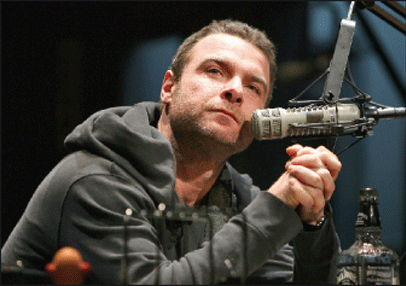By Scott Harrah
This revival of Eric Bogosian’s 1987 drama “Talk Radio” (originally produced downtown at the Public Theater) may seem tame in the 21st century, an era in which “trash TV” and tabloid journalism are both commonplace, but there’s one thing that keeps the show compelling from beginning to end: Liev Schreiber.
The movie star and stage actor — who won a Tony for his role in “Glengarry Glenn Ross” — is consistently ebullient as late-night, talk-radio host Barry Champlain, a man who seems a bit like Howard Stern without the oddball sense of humor. Working at a Cleveland radio station, Champlain gets his share of kooks calling in, but he soon learns that his show is about to be picked up by a nationwide broadcasting corporation. This one-act drama focuses solely on his last night before he goes national, and although the plot is thin, the show’s energy manages to sustain the audience’s interest for 90 minutes.
Champlain gets phone calls from the usual staples of “trash” radio and TV: transsexuals, anti-Semites, “nut jobs,” people high on drugs, and people playing pranks. This may seem unremarkable to generations of people weaned on Jerry Springer’s lowbrow show, the shenanigans of Howard Stern, and tabloid programs and magazines that exploit and sensationalize anything scandalous concerning celebrities. Compared to today’s nonstop coverage of celebrity fluff and sleaze, Champlain’s callers from two decades ago almost seem innocuous.
Champlain is caustic and amusingly abrasive as he answers each call. Whenever he finds a certain caller dull or offensive, he quickly cuts them off before they finish what they have to say. He is particularly witty and antagonistic when he gets callers that really try to rile him, such as a neo-Nazi who makes fun of Champlain being Jewish. Without an actor as skilled and with such a larger-than-life stage presence as Schreiber, “Talk Radio” — with its depiction of Reagan-era America, which seems curiously innocent in this post 9/11 age of Iraq, terrorism, and global turmoil — might come across as an amusing anachronism. Make no mistake, though, for this is Schreiber at his most raw and visceral, and he helps audiences overlook any of the play’s dated aspects. With every high-strung mannerism, Schreiber’s on-the-edge behavior and excoriating monologues demand our constant attention.
Along the way, a fine cast of actors supports Schreiber. Peter Hermann is superb as the straitlaced station manager Dan Woodruff; former girlfriend Linda (Stephanie March) and co-worker Stu (Michael Laurence) are equally powerful; and director Robert Falls keeps everything moving at precision speed. One of the play’s best supporting roles is played by Sebastian Stan as Kent, a teenage druggie who shows up at the station after phoning in a questionable story about his purported girlfriend. It is this emotionally fragile listener who truly tests Barry Champlain’s capacity for dealing with his crackpot fans, and just how dangerous they can actually be. Schreiber is at his most riveting when he is interacting with his offbeat callers — people who love to evoke any kind of reaction from him.
Although “Talk Radio” is almost more of an extended performance art piece than a full-length drama, this is a character study of a man exorcising his demons in public. Those looking for a more traditional straight play may be somewhat disappointed by the scattershot narrative, but audiences are definitely kept in suspense as we wonder just how long it is going to take before Schreiber’s chain-smoking, booze-swilling Barry Champlain finally snaps from the pressure of his histrionic callers.
































